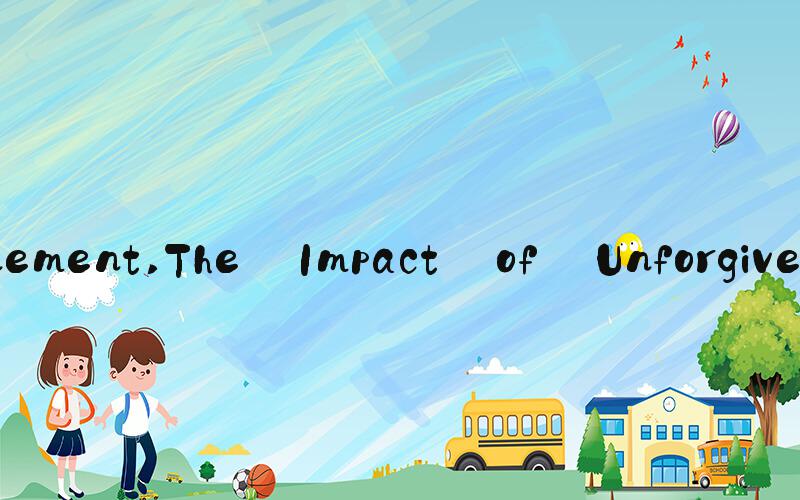AI答案
 Atonement: The Journey to Forgiveness
Atonement: The Journey to ForgivenessAtonement is a process of making amends for wrongdoing, repairing relationships, and seeking forgiveness. It is a journey that requires courage, humility, and vulnerability. It is not an easy path, but it is a necessary one for those seeking to heal their own wounds and repair the damage done to others.
The Impact of UnforgivenessUnforgiveness can be a heavy burden to carry. It can consume us, causing bitterness and anger to fester within us. The weight of unforgiveness can have physical, emotional, and spiritual consequences that impact not only ourselves but also those around us. It can rob us of joy, peace, and freedom.
The Power of ForgivenessForgiveness is not a one-time event, but rather a journey that often takes time and effort. It requires us to acknowledge the pain caused by our actions, express sincere remorse, and take responsibility for our actions. It is a process of restoring trust, repairing relationships, and reaching out with compassion and understanding to those we have wronged. Forgiveness has the power to heal wounds, restore broken relationships, and bring a sense of peace and wholeness to our lives.
The Role of AccountabilityAccountability is a crucial component of atonement. It is our responsibility to take ownership of our actions and the impact they have had on others. This means being willing to listen, learn, and make amends where possible. It requires us to be honest with ourselves and others about our mistakes and shortcomings. Accountability is not just about admitting fault, but also about taking concrete steps to demonstrate our commitment to change.
The Challenges of ForgivenessForgiveness is not always easy. It can be especially difficult when the hurt we have caused is deep and long-lasting. It may require us to confront uncomfortable truths about ourselves and our actions. It may require us to face our deepest fears and vulnerabilities. It may require us to let go of pride, anger, and resentment. But despite these challenges, the rewards of forgiveness are worth the effort.
The Importance of Self-ForgivenessSelf-forgiveness is an essential component of the atonement process. It is easy to get caught up in self-condemnation and guilt, but these feelings are not productive or helpful. We must learn to forgive ourselves and extend the same compassion and understanding to our own mistakes that we would offer to others. Self-forgiveness is a process of releasing shame and embracing self-acceptance, recognizing that we are all flawed human beings on a journey of growth and self-discovery.
The Journey ContinuesThe journey of atonement is ongoing. It requires us to continually examine our thoughts, actions, and attitudes, and seek to live in a way that honors our values and respects the dignity of those around us. It requires us to embrace humility, vulnerability, and empathy as we navigate the complexities of human relationships. It is not a destination but a process — one that requires perseverance, resilience and dedication.
As we continue on this journey, we recognize that forgiveness is not just for those who have wronged us, but also for ourselves. Through our willingness to seek forgiveness, we can restore relationships, heal wounds, and achieve greater peace and wholeness in our lives. Let us embrace the power of atonement and forgiveness, and let it transform us into better, more compassionate, and more connected human beings.
